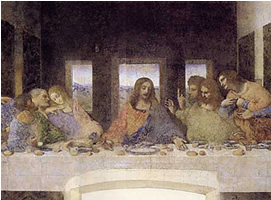 |
The
Last Supper (detail) Leonardo da Vinci, 1498, Milan |
Maundy Thursday falls during Holy Week on the Thursday before Easter, and commemorates the events that occurred during the meal Jesus shared with his followers before his arrest, trial, and crucifixion. Although Jesus and his disciples were participating in the Jewish observance of Passover*, Christians remember it as the occasion of the “last supper”, when Jesus established the ceremony subsequently known as the Eucharist**.
Some scholars believe that maundy comes from the Latin mandatum, ‘commandment’, referring to Jesus’ command to his disciples to love one another. Others believe the word derives from the royal custom of distributing goods to the poor on this day in a basket known as a maund.
During the meal, Jesus gave new meaning to the symbolic bread and wine of the Passover observance. Anticipating the events that would follow, he identified the bread with his own body “given for you”, referring to the wine as the “cup [of] the new covenant...” (Luke 22: 19-20)
Early Christians would commemorate this meal with the agape*** feast as a way of observing his commandment and remembering his sacrifice; the consecration of the bread and wine would eventually be separated from the agape and become formalised into the Eucharist, or rite of holy communion.
On the evening of the Last Supper Jesus demonstrated the kind of love and service he wanted of his disciples by bathing their feet. In the 17th century the monarch of Britain would emulate this act of humility by washing the feet of a few selected poor. Alms would also be distributed, and in the ceremony of the Royal Maundy still observed today, deserving senior citizens are given red and white purses containing specially minted coins: the white purse contains one coin for each year of the monarch’s reign, and the red contains a symbolic amount of money that replaces the gifts that were previously distributed.
After the meal Jesus and his disciples retired to the Garden of Gethsemane on the Mount of Olives. There, while his followers slept, he asked God to take away the suffering that he was about to endure. In the end he relented: yet not my will, but yours be done (Luke 22: 42). Shortly thereafter he was arrested by armed men who had been led there by one of his own disciples, Judas.
*Three
of the four accounts of these events in the Christian Bible identify this
meal as being that of the Jewish observance of Passover.
**Literally ‘good gift’ or ‘thanksgiving’. Central
rite of the Christian religion, in which bread and wine are consecrated
and consumed in obedience to Jesus’ command to “do this in
remembrance of me.”
***A Greek word translated in the New Testament as ‘love’
or ‘charity’.